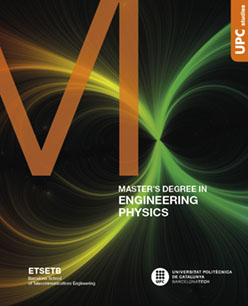Master's degree in Engineering Physics

Master's degree in Engineering Physics
Escola Tècnica Superior d'Enginyeria de Telecomunicació de Barcelona (ETSETB)
El master’s degree in Engineering Physics (web del màster) (màster universitari en Física per a l'Enginyeria) està orientat a l’enginyeria de frontera a partir d’una formació avançada de física. L'enginyeria especialitzada en camps com la nanotecnologia, la nanoelectrònica o l'enginyeria biomèdica requereix cada dia més professionals amb una formació profunda en física avançada, amb bons coneixements de física quàntica, física de sistemes complexos o física de dispositius, aplicables tant a escala nanoscòpica com en grans instal·lacions.
Per accedir-hi cal acreditar que es té un títol de grau en Física o en Enginyeria Física, amb 240 ECTS cursats.
- Durada i inici
- Un any acadèmic si es comença el setembre, un any acadèmic i mig si es comença el febrer, 60 crèdits ECTS. Inici: febrer i setembre
- Horaris i modalitat
- Matí. Presencial
- Preus i beques
- Preu aproximat del màster sense altres despeses addicionals (no inclou taxes acadèmiques de caràcter no docent ni expedició del títol):
1.660 € (6.331 € per a no residents a la UE).
Més informació sobre preus i pagament de la matrícula
Més informació de beques i ajuts - Idiomes
- Anglès
Informació sobre l'ús de llengües a l'aula i els drets lingüístics de l'estudiantat.
- Lloc d'impartició
- Escola Tècnica Superior d'Enginyeria de Telecomunicació de Barcelona (ETSETB)
- Títol oficial
- Títol oficial.
- Requisits generals
- Requisits acadèmics d’accés a un màster
- Requisits específics
- Per accedir-hi cal acreditar que es té un títol de grau en Física o en Enginyeria Física, amb 240 ECTS cursats.
- Places
- 30
- Preinscripció
- Període de preinscripció obert.
Termini previst: fins al 01/07/2024.
Com es formalitza la preinscripció? - Admissió i matrícula
- Com es formalitza la matrícula?
- Legalització de documents
- Els documents expedits per estats no membres de la Unió Europea ni signataris de l’Acord sobre l’espai econòmic europeu han d'estar legalitzats per via diplomàtica o amb la postil·la corresponent.
Primer quadrimestre
Segon quadrimestre
- Aprenentatge Automàtic amb Xarxes Neuronals 4
- Caracterització en Biofísica i Ciència de Materials 4
- Ciència de Materials en Fàrmacs 4
- Complexitat en Sistemes Biològics 4
- Grans Instal·lacions: Sincrotró i Fonts de Neutrons 5
- Mètodes Estocàstics per a Optimització i Simulació 4
- Matèria Condensada Molecular i Tova 4
- Treball de Fi de Màster 17
- ObligatòriaECTS
- OptativaECTS
- ProjecteECTS
Sortides professionals
- Sortides professionals
- Indústria amb un elevat component de desenvolupament tecnològic.
- Centres de recerca fonamental i aplicada.
- Grans instal·lacions de recerca.
- Doctorat en centres de recerca o Universitats.
- Enginyeria de frontera en el camp de la nanotecnologia.
- Tècnic qualificat en centres de recerca i grans instal·lacions
- Competències
-
Competències transversals
Les competències transversals descriuen allò que un titulat o titulada ha de saber o ha de ser capaç de fer en acabar el procés d'aprenentatge, amb independència de la titulació. Les competències transversals establertes a la UPC són emprenedoria i innovació, sostenibilitat i compromís social, coneixement d'una tercera llengua (preferentment l'anglès), treball en equip i ús solvent dels recursos d'informació.
Més informació
- Centre docent UPC
- Escola Tècnica Superior d'Enginyeria de Telecomunicació de Barcelona (ETSETB)
- Responsable acadèmic del programa
- Pol LLoveras Muntané
- Calendari acadèmic
- Calendari acadèmic dels estudis universitaris de la UPC
- Normatives acadèmiques
- Normativa acadèmica dels estudis de màster de la UPC
Sessió informativa
Master's degree in Engineering Physics
Escola Tècnica Superior d'Enginyeria de Telecomunicació de Barcelona (ETSETB)
- Dia
- 09/05/2024
- Hora
- 12:00 h
- Més informació
- Sessió virtual. Cal inscripció prèvia. Més informació
- Idioma
- Anglès
Preinscripció
La preinscripció d'aquest màster està actualment tancada.
Utilitza el formulari 'Sol·licita informació' per posar-te en contacte amb el màster perquè t'informin dels nous períodes de preinscripció.

